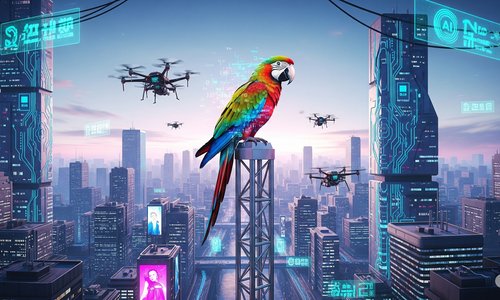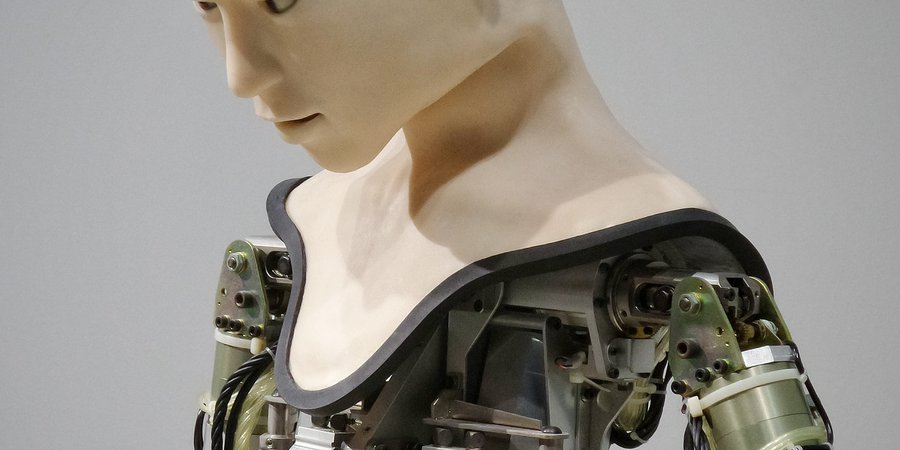
A Promessa e o Perigo da Nova Revolução Digital
A nova corrida tecnológica global levanta uma pergunta urgente: estamos prontos para confiar na inteligência que criamos?

Como curioso e pesquisador na área de inteligência artificial, vejo comparações bastante interessantes sobre inteligência humana e inteligência artificial. Uma das mais utilizadas são variações do livro “Robot: Mere Machine to Transcendent Mind”, de 1998, de Hans Moravec. Moravec é natural da Áustria e tem atuado por muito tempo nos Estados Unidos. Ele é, entre outras coisas, um futurista, nome que se dá a pessoas que se dedicam a estudos sobre futuro. Suas publicações e previsões são focadas no tema de transhumanismo. O Transhumanismo, por sua vez, é uma filosofia que tem como objetivo melhorar a condição humana a partir do uso de ciência e tecnologia (biotecnologia, nanotecnologia e neurotecnologia) para aumentar a capacidade cognitiva e superar limitações físicas e psicológicas.
(Reprodução: “Robot: Mere Machine to Transcendent Mind”, de Hans Moravec)
A comparação utilizada por Moravec tem dois indicadores: o primeiro, o megabyte, como unidade de armazenamento de dados, e o segundo, a MIPS (Milhões de Instruções por Segundos), que é um indicador, bastante questionado, de capacidade de performance computacional. Num gráfico plotado com o indicador megabytes na horizontal e MIPS na vertical, o cérebro humano está no canto superior direito do gráfico, com uma alta capacidade de armazenamento de dados e uma alta condição de processamento de instruções por segundo.
A comparação muitas vezes vem acompanhada por um gráfico de custo de poder de processamento computacional. Este gráfico mostra que por US$ 1.000 temos conseguido adquirir máquinas com poder de processamento cada vez maior ao longo dos anos, seguindo a Lei de Moore [que dizia, em 1965, que o poder de processamento dos computadores dobraria a cada 18 meses]. É da leitura simples e superficial deste gráfico que vem a maioria das previsões que de 2030 a 2050 teremos máquinas com capacidade de processamento semelhante à do cérebro humano.
Reprodução: “Robot: Mere Machine to Transcendent Mind”, de Hans Moravec)
Alguns pontos de reflexão importante pouco feitos na leitura destas informações. Esta capacidade de processamento de instruções não leva em consideração a complexidade da instrução dada, nem a integração de diversas instruções necessárias para dar conta das diversas tarefas complexas que, como humanos, executamos todos os dias.
Não quero dizer que em 2030 não teremos computadores, máquinas ou robôs capazes de fazer boa parte das tarefas complexas que nós, humanos, fazemos, tampouco quero dizer o contrário. Apenas acho que a comparação e os indicadores utilizados são muito simplistas para que possamos chegar a qualquer conclusão digna de se dar crédito.
O ponto-chave é que a discussão é muito mais ampla e complexa do que isso, e começa por uma pergunta muito simples e profunda: “O que é inteligência?”
Pegando o verbete no dicionário disponível no Google, temos:
inteligência:
substantivo feminino
1.
faculdade de conhecer, compreender e aprender.
2.
capacidade de compreender e resolver novos problemas e conflitos e de adaptar-se a novas situações.
3.
conjunto de funções psíquicas e psicofisiológicas que contribuem para o conhecimento, para a compreensão da natureza das coisas e do significado dos fatos. "a doença afetou a sua inteligência"
4.
modo de interpretar, de julgar; interpretação, juízo.
5.
POR METONÍMIA
indivíduo de grande inteligência; sumidade.
6.
harmonia, entendimento recíproco. "viver em boa inteligência"
7.
acordo ou combinação secretos; maquinação, conluio.
Focando nas quatro primeiras definições, que são as mais comuns e abrangentes, eu me atrevo a dizer que já temos em mãos boa parte dos pré-requisitos necessários para criar algoritmos, máquinas e robôs aos quais podemos definitivamente dar a alcunha de máquinas inteligentes. E se continuarmos neste ritmo, é provável que tenhamos máquinas e computadores com capacidade de integrar uma gama cada vez maior de instruções e atividades, sendo capazes de fazer atividades cada vez mais complexas.
As tecnologias que hoje estão por trás do que chamamos no jargão popular de inteligência artificial nos permitem fazer um conjunto de tipos de tarefas que combinadas podem ser a base de seres artificiais verdadeiramente inteligentes.
Se hoje a inteligência humana nos permite:
Compreender contexto,Extrair informações relevantes de uma conversa,Planejar e otimizar,Falar,Interagir,Responder adequadamente a um problema,Gerar frases e histórias,Reconhecer pessoas e objetos,Negociar,Aprender padrões,Seguir regras estabelecidas
As tecnologias abaixo, todas elas ligadas ao que chamamos de inteligência artificial, nos permitem fazer respectivamente as mesmas coisas:
Visão computacional e segmentação visual semântica,Processamento de linguagem natural,Algoritmos de planejamento e otimização,Geração de voz artificial,Chatbots,Sistemas especialistas,Geração de linguagem natural,Reconhecimento facial e de objetos,Algoritmos de otimização e de tomada de decisão,Aprendizagem de máquina e aprendizagem profunda (deep learning),Robotic Process Automation - RPA
E neste ponto há uma grande discordância minha em relação ao gráfico de Hans Moravec. O que fará com que os algoritmos de inteligência artificial fiquem cada vez mais “inteligentes” e capazes de darem conta das tarefas altamente complexas que nós, humanos, podemos executar não é a capacidade de processamento, nem mesmo a capacidade de armazenagem, mas sim, a nossa capacidade, como humanos, de compreendermos todo o potencial desta tecnologia tão disruptiva que é a inteligência artificial, e usarmos a nossa criatividade para construir arquiteturas, sistemas e soluções cada vez mais inovadores.
As bases tecnológicas para o supercomputador ou o super-robô já estão presentes nos dias de hoje. Cabe a nós organizarmos estas tecnologias, não para fazer o que os humanos são capazes de fazer, mas sim, fazer coisas que jamais sonhamos.
Se você quer ajudar a construir este mundo novo que chamamos de futuro, definitivamente, está na hora de colocar muito mais conhecimento a respeito desta tecnologia no seu dia a dia. E que venha o futuro!
Conselheiro fundador da I2AI – Associação Internacional de Inteligência Artificial. Também é sócio-fundador da Engrama, sócio da Startup Egronn, e na consultoria Advance e investidor na startup Agrointeli . Tem mais de 20 anos de experiência em multinacionais como Siemens, Eaton e Voith, com vivência em países e culturas tão diversas como Estados Unidos, Alemanha e China.
Palestrante internacional, professor, pesquisador, autor, empreendedor serial, e amante de tecnologia. É apaixonado pelo os temas de Estratégia, Inteligência Competitiva e Inovação.
É Doutor em Gestão da Inovação e Mestre em Redes Bayesianas (abordagem de IA) pela FEA-USP. É pós-graduado em Administração pela FGV e graduado em Engenharia Mecânica pela Unicamp.

A nova corrida tecnológica global levanta uma pergunta urgente: estamos prontos para confiar na inteligência que criamos?

Por que dominar a IA será a nova alfabetização do século XXI

Conselhos de Administração devem evoluir da supervisão reativa para a antecipação estratégica, frente à crescente complexidade e volatilidade dos ambientes de negócios.

De 14 a 25 de julho, reserve suas manhãs das 08h00 às 09h30 para participar da tradicional Maratona I2AI! Uma jornada intensa com debates e palestras sobre temas essenciais: Ética,